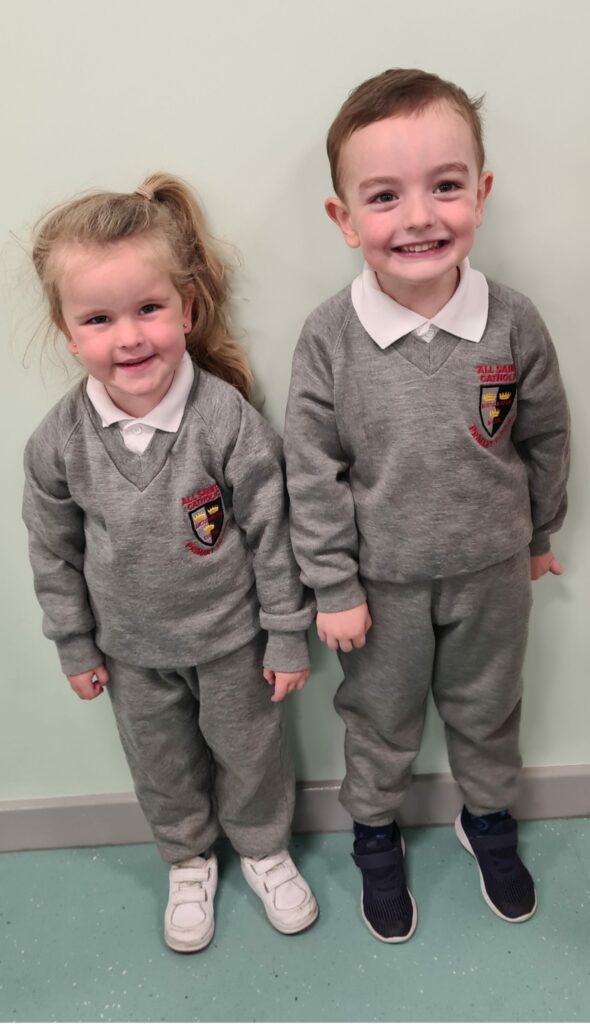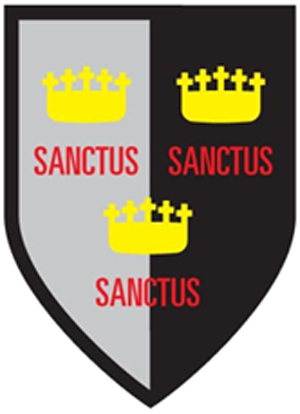Opening Hours
The opening hours at the nursery are 8.00am – 6.00pm. The nursery is a term time provision and is available for children aged 2 years of to five years old.
Attending the nursery does not guarantee a place in reception class.
Parents and carers need to follow the admission procedure for reception class through Liverpool City Council
For children who are not entitled to nursery education funding the charges are:
£24.00 for half day, £48.00 for full day
*Please note that there are no additional charges for consumables
For information on help with paying nursery fees or funding entitlements please go to
Nursery Uniform

We like to be comfy in nursery so this is what we wear:
- School jumper or cardigan – Can be purchased from the school office.
- White polo shirt – Can be purchased from any supermarket.
- Grey joggers – Can be purchased from any supermarket.
- Velcro trainers
Our Classrooms
Please click on the links below to view our class pages and our weekly timetables.
Meals and Snacks
At All Saints we provide breakfast, lunch and afternoon snacks for our children. Our two-year-old children’s lunches are catered by Homebaked Bakery in Anfield.

Our Three-Year-Old and Reception children have their lunch in the school cafeteria and are offered a well-rounded menu that rotates on a three-weekly basis. Children have the choice of a hot or cold lunch that includes sides and a dessert.
Communication and Assessments
Seesaw
At All Saints, we use Seesaw to communicate with you virtually and to keep track of “Wow Moments” and record progress that your child is making. This online learning journey is a great way for you to see what you child has been up to in Nursery and keep in contact with your child’s teacher or key worker about progress and next steps.
If you do not have access to Seesaw please speak to your child’s key worker or a member of staff within their room.
Please click here to access the Seesaw webpage
Learning Journals
Another platform that we use in our EYFS is called Learning Journals. This platform has the assessment tool that we use to record children’s progress alongside the OPAL curriculum. Please see below for more information about this. The OPAL curriculum and milestones are used to inform our parent meeting every six months. You will receive access to this platform via email.
https://parentzone.yourlearningjournals.co.uk
Statutory Assessments
2 Year Progress Check
As part of our assessment all children have a statutory 2 year progress check, completed before their third birthday, usually in the spring term when children are well settled in to the nursery routine and your child’s keyworker has an in depth knowledge of your child well enough to carry out an accurate assessment. This assessment covers the 3 prime areas of learning and compliments the assessment completed by your child’s health visitor. The check will help us identify your child’s strengths and any areas where your child’s progress is less than expected. The 3 prime areas are:
- Communication & Language
- Physical Development
- Personal, social and emotional development.
The 2 year progress check is shared with parents and carers whose input is invaluable. If we feel a child would benefit from extra support we can help parents access this.
Reception Baseline Assessment (RBA)
This statutory assessment is administered in the first six weeks of the Reception Year. All children must be assessed even if for some reason they begin the year later than usual. The assessment is given one-on-one with the class teacher and child and involves a series of questions assessing starting points in language, communication, literacy and mathematics.
For more information please visit the government website:
Reception baseline assessment – GOV.UK (www.gov.uk)
EYFS Profile Assessment
The statutory EYFS framework requires the EYFS profile assessment to be carried out in the final term of the year in which a child reaches age 5, and no later than 30 June in that term. The EYFS profile should provide a reliable, valid and accurate assessment of each child’s development at the end of the EYFS Reception Year. It is made up of an assessment of the child’s outcomes in relation to the 17 early learning goal (ELG) descriptors. Practitioners and teachers should use their professional judgement to make these assessments, based on their knowledge and understanding of what the child knows, understands, and can do.
The primary purpose of the EYFSP at the end of Reception is to support a successful transition to Key Stage 1 (KS1) by aiding the professional dialogue between EYFS and year 1 teachers. It should inform year 1 teachers about each child’s stage of development and learning needs and help them to plan the year 1 curriculum to meet the needs of all children. The EYFS profile is also used to inform parents about their child’s development and will be reported on the final report card. Children are defined as having reached a Good Level of Development (GLD) at the end of the EYFS if they have achieved at least the expected level for the ELGs in the prime areas of learning and the specific areas of mathematics and literacy. This helps teachers and parents to understand broadly what a child can do in relation to national expectations. In addition, the EYFS profile provides a national child learning and development data set at the end of the EYFS.
For more information please visit the government website:
Early years foundation stage profile handbook_2022 (publishing.service.gov.uk)
How can you help at home?
There are lots of ways that you can help to support your children at home.
Literacy, Communication and Language
- Read with your child every day! A great time to do this is before bed, but it is also fun to read in the bath, in the car or whenever the mood strikes!
- Talk to your child as much as possible. Children love talking to you and no matter what their age they love the sound of your voice. Turn off phones, tvs and devices and spend quality time talking as much as you can.
- Sing songs and recite nursery rhymes. The more rhyme and rhythm that children hear, the better tuned their ears will be for sounds when they begin to read and write.
- Turn reading into a game! Playing games like “I spy” really help turn finding sounds into great fun!
Mathematics
- Go on a number hunt! Can you find numbers on buses, trains, houses, signs?
- Count the steps going up and down at home
- Sing number songs and rhymes such as “Five Little Ducks” “Ten Green Bottles”
- Find shapes around you and point them out. Tringle pizza slices, round apples and cakes, rectangular doors, the ideas are endless
- Play board games! Using dice to count, taking turns, moving your counter a number of spaces – these are all great ways of making maths fun.
